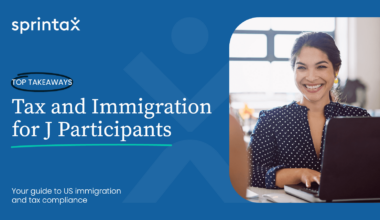(Last updated: 24 Mar 2025)
The tax you pay in the US is determined by your residency status for tax purposes.
What is a Nonresident Alien?
Typically, a nonresident alien is someone who is legally present in the US but doesn’t have a green card. Nonresident aliens (NRAs) must pay income tax on income earned from a US source. If you are a nonresident alien, you must keep records of all sources of income so the IRS can see proof of what should be taxed and what should be exempt.
Students on F-1 and J-1 status are typically considered nonresident aliens for the first 5 years in student status, including the tax year (January 1 – December 31). In the 6th year, you become a resident for tax purposes.
Scholars on J-1 status are considered NRAs for the first 2 years so scholars who arrived in 2023 or later are nonresidents for the 2024 tax year.
Other non-immigrant statuses: Dependent on the substantial presence test.
Form 8843
Required of all F visa and J visa holders —even without any income.
All non-immigrants in F or J status who are deemed “nonresidents for tax purposes” must mail a form 8843 if they were in the US for any part of the tax year, January 1 to December 31.
If you didn’t have any income, you can mail this form alone. If you did have income, the 8843 form is to be included with other forms in your nonresident tax return.
What is a tax return and what’s the deadline?
Your tax return reports your income and taxes withheld, if any, during the tax year (January 1 – December 31). If you’ve overpaid taxes, you’ll get a refund and if there’s a shortfall, you’ll owe money. If you work in the US or have other US-sourced income, you may have taxes withheld.
15 Apr 2025 is the deadline for your 2024 tax return.
Every year, you have to file an income tax return with the federal tax authorities. Each state has its own tax regulations so you also may need to file a state tax return.
Sprintax can help you prepare both your federal and state tax returns.
Sources of income include:
- On-campus and off-campus employment
- Scholarship/fellowship grants/stipends
- Graduate or teaching assistantships
- Salary for a teaching or research appointment
Tax Treaties
You may be also eligible for a tax treaty that may limit your taxable income. Sprintax can check for this when you fill in your details.
Documents you’ll need:
- Passport
- Visa/Immigration info-including Form DS-2019 or Form I-20
- Social Security or Individual Taxpayer Identification Number (if any)
- US entry and exit dates for all visits
- Tax-related forms
Tax forms
You may receive one or more of the following—or none— depending on your circumstances!
- W-2 form – it reports your wages from each employer;
- 1042-S:
- Reports scholarships, fellowships, grants, awards and any other payment made to you by a US source that was NOT compensation for services, i.e. for which you did NOT work. If your scholarship or fellowship provided tuition exemption or reduction, but no stipend, you will not receive a 1042-S form since you didn’t receive a payment that is considered income.
- Also, reports earned income that is exempt from tax because of a tax treaty between your country of residence and the US.
- 1099 – Bank interest, stocks, funds.
Preparing your tax return
You can use Sprintax to prepare your nonresident tax return.
Sprintax will also:
- Determine your tax residency status
- Identify what forms you need to file
- Apply for any tax treaty benefits
- Complete and generate the forms you need, along with mailing instructions
- 24/7 Live Chat help
Sprintax can also:
- Prepare state tax returns (for a fee)
- E-file your 1040-NR
- Generate form 843 to request a refund of Social Security / FICA payments if withheld in error (for a fee).
To get started, click here to create a Sprintax account








